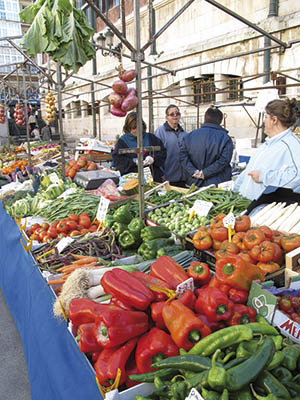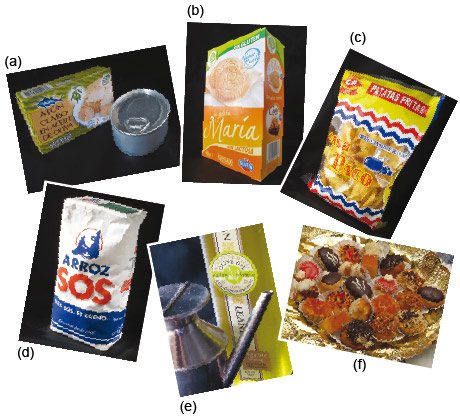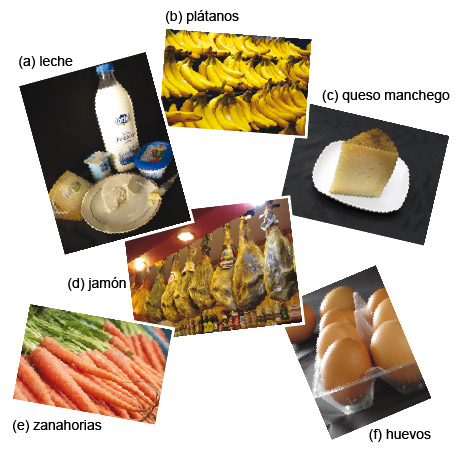Actividad 1
Markets in Spain and Latin America are full of vibrant colours, noise, scents and fresher products than you would find in most supermarkets. In this activity you will practise how to shop for recipe ingredients.
A
Pilar, a regular customer at the market, is comparing prices in the frutería before she buys anything. Listen to the following audio track and write down the prices you hear, as in the example.
Escucha y escribe.
Transcript: Fruit and vegetables
Here’s someone asking about the price of fruit and vegetables.
—¿Cuánto valen los plátanos?
—Uno cincuenta el kilo.
—¿A cuánto están los limones?
—Los limones a uno veinte el kilo.
—¿Cuánto vale el kilo de patatas?
—Setenta céntimos.
—¿A cuánto está el kilo de tomates?
—A uno setenta.
—¿Y cuánto cuesta esta lechuga?
—La lechuga noventa céntimos. Pero ¿compra o no compra?
Ejemplo
Answer
- plátanos – uno cincuenta el kilo (€1,50)limones – uno veinte el kilo (€1,20)
- patatas – setenta céntimos el kilo (€0,70)
- tomates – uno setenta el kilo (€1,70)
- lechuga – noventa céntimos (€0,90)
Language: Asking for prices
Here are some useful expressions to ask for prices when shopping for food.
| ¿Cuánto es? | How much is it? |
| ¿Cuánto vale / cuesta? | How much does it cost? |
| ¿Cuánto valen / cuestan? | How much do they cost? |
When asking the price of goods whose prices fluctuate daily, like fish or fruit in markets, the following expressions are used.
| ¿A cuánto está el bacalao? | How much is cod going for (today)? |
| ¿A cuánto están las cerezas? | How much are cherries (today)? |
Comment
The verb valer, commonly used to ask for prices, means literally ‘to be worth’. It is also used very frequently in the following expressions.
| Vale la pena. | It is worth it. |
| No vale la pena. | It is not worth it. |
B
Now listen to the audio track below and follow the prompts to ask for the prices of the items you hear.
Escucha y habla.
Transcript: Prices
Use the prompts to ask the price of each item.
Ejemplo
(calamares)
¿Cuánto cuestan los calamares?
or
¿Cuánto valen los calamares?
Now it’s your turn.
(huevos)
—¿Cuánto cuestan los huevos?
(mantequilla)
—¿Cuánto cuesta la mantequilla?
(queso de cabra)
—¿Cuánto cuesta el queso de cabra?
(madalenas)
—¿Cuánto valen las madalenas?
(chorizo)
—¿Cuánto vale el chorizo?
(pollo)
—¿Cuánto cuesta el pollo?
C
Here is some vocabulary for items of food that you may want to buy. Match the phrases in Spanish with the relevant products.
Relaciona.
- una botella de aceite
- una caja de galletas
- una bolsa de patatas fritas
- una bandeja de dulces
- un paquete de arroz
- una lata de atún
Answer
1–(e); 2–(b); 3–(c); 4–(f); 5–(d); 6–(a).
D
Listen to the following audio track and match the quantities listed below with the relevant products, as you hear them mentioned. Which quantity or product has not been mentioned?
Escucha y relaciona.
Transcript: Shopkeeper and customer
Listen to this dialogue between a shopkeeper and a customer.
—¿Qué le pongo?
—Me da cien gramos de queso.
—Sí. ¿Algo más?
—Sí, un cuarto de jamón.
—¿Otra cosita?
—Sí, un kilo de zanahorias y un kilo de plátanos.
—¿Algo más?
—Hmm… Ah sí. Un litro de leche y media docena de huevos, por favor.
—¿Es todo?
—Eh… sí. ¿Cuánto es, por favor?
- 100 gramos de…
- un cuarto de kilo de…
- medio kilo de…
- un kilo de…
- un litro de….
- media docena de…
Answer
1–(c); 2–(d); 4–(b) and (e); 5–(a); 6–(f).
The quantity that was not mentioned was medio kilo.
Comment
Weights and measures are metric in all Spanish-speaking countries, so when someone says un cuarto de or medio de it is assumed that it is a quarter of a kilo or half a kilo.
Language: Weights and quantities
Here are some of the more common phrases used to talk about weights and quantities when shopping.
| un kilo de fresas | a kilo of strawberries |
| medio kilo de carne picada | half a kilo of mince |
| un cuarto de kilo de queso de cabra | a quarter of a kilo of goat's cheese |
| un litro de aceite de oliva | a litre of olive oil |
| una docena de huevos | a dozen eggs |
| media docena de huevos | half a dozen eggs |
| una lata de espárragos | a tin of asparagus |
| una caja de bombones | a box of chocolates |
| una bolsa de magdalenas | a bag of fairy cakes |
| un paquete de azúcar | a packet of sugar |
| una bandeja de canapés | a tray of canapés |
| una botella de zumo de naranja | a bottle of orange juice |



